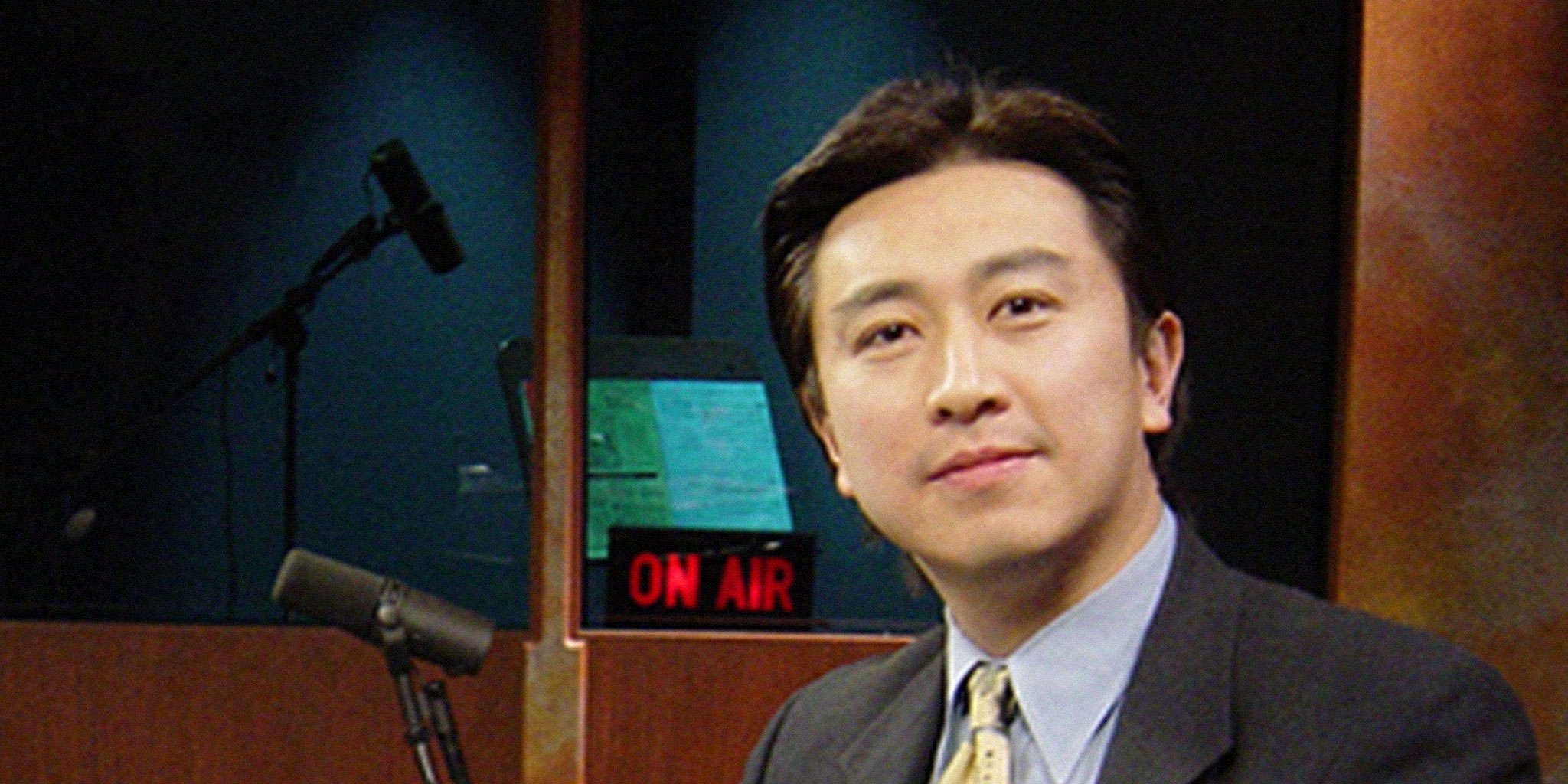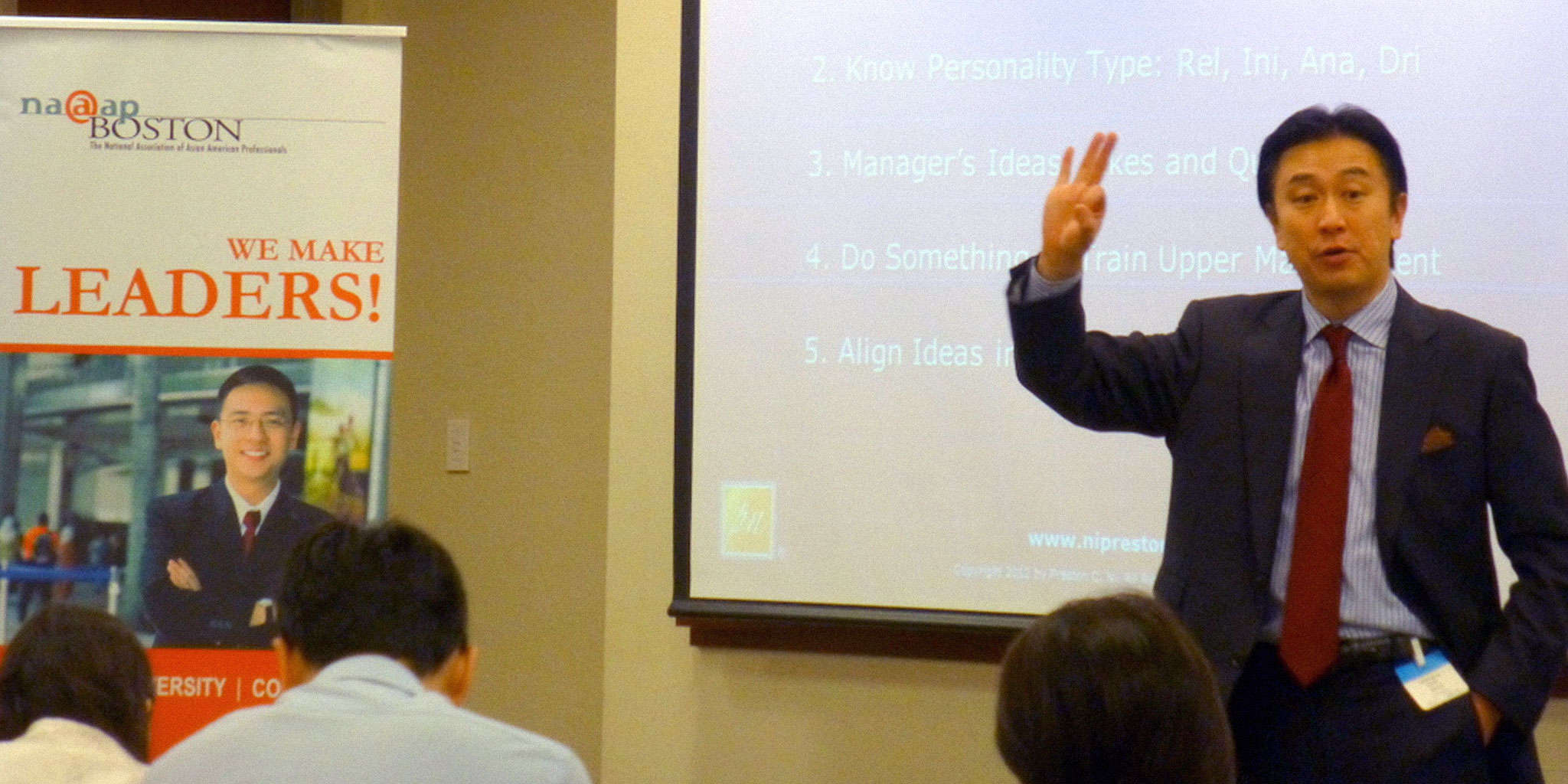Interview with Preston Ni
Michael Sliwinski: Preston, you are a coach in some very interesting areas of personal and business success. And also happiness. Could you tell us more about yourself?
Preston Ni: I’m Preston Ni and my primary career is a professor of communication studies. And I teach at Foothill College. We’re in the Silicon Valley, just south of San Francisco. So we’re next to Apple, and Google, and Stanford. I work with a lot of technical folks, high-tech professionals and business professionals on improving their communication skills. Specifically, I help people with leadership, cross-cultural communication, negotiation skills, emotional intelligence skills.… So it’s a very interesting career, where I can help people become more effective, or as your magazine will put it, much more productive. Not just as professionals, but as human beings.
Michael: So let’s jump right to communication. What would you say are the greatest communication hindrances?
Preston: Here are two of the most common problems that prevent people from being as successful as they can be in communication. Number one: some people are very good in solving business- or technology-related problems, but they’re not very good with their people skills. Others may be very good with people skills—they’re very popular and likable—but they’re not very strong or assertive in their problem-solving skills.
So one of the most common problems I see in communication is that people lack the ability to be both. Because problem solving is generally more left-brain oriented, people skills are more right-brain. And most people are either more left-brained or more right-brained. And unless you take, say, communication courses like the ones I teach at the college, you don’t really develop a strong balance between the two.
This way you can be very diplomatic and professional with people, to have good people skills with them, and be strong in your problem-solving ability at the same time.
Michael: And the second problem you observe?
Preston: It is the lack of recognition as far as the type of personality you may be communicating with. When we negotiate, when we talk with our managers, or customers, or colleagues, depending on their personality, someone who is more analytical may require a different type of communication than someone very entrepreneurial or creative. So knowing the type of personality you’re dealing with can be very helpful, because you also know what type of communication skills can motivate them, can get their attention, and get their cooperation. And these are very simple communication skills, which we’ll learn once we understand how different personalities communicate differently.
Michael: That is perhaps the same theory that stands behind a negotiation or pitch theory I read about. When you’ve got a pitch or a presentation to make, you should try to attack from several different angles and see how the person responds. And then by seeing their reaction you can choose what technique to use to achieve your goals.
Preston: Exactly. In presentation as well as in negotiations one of the first rules is you have to understand your audience and know where they’re coming from. Then you can figure out ways for you to communicate and to relate to them. And for them — to be able to relate to you. Just because you have a brilliant idea doesn’t mean that other people see what you see, or feel as passionate as you do. So you want to find the right kind of communication to get across to them so that they understand what your vision is and can identify ways to work with you and share your passion.

Michael: And what about communication in distributed teams? In Nozbe, we are 20 people and growing, but we all work remotely — from our homes. We don’t see each other that much. We communicate either through text or through audio mostly. What would you say would help us improve the way we communicate?
Preston: I would recommend three things. First of all, because everyone works remotely in your organization, good preparation ahead of meetings/discussions is vital. Good preparations means that as the leader, you want to clearly articulate the context for the meeting: What is the context? What are the objectives? What are the outcomes? And also maybe, what are the guidelines? A guideline can be as simple as “I know we disagree on this, but let’s make sure we get through all of our points today. And if there are a lot of discussions about what you agree or disagree with, we can take that offline.” So as a leader you prepare your team for what to expect over the next 20-30 minutes of the meeting. And then, I recommend as often as possible discussions should be done person-to-person by phone, or by video-conferencing. Discussion, deliberations — it’s better to go over them live with another human being rather than in writing. Now, the preparation part should be done in writing. You outline what you want to accomplish before the meeting. And then the meeting should be as human as possible. And then afterwards, you follow up in writing, what you have accomplished. And then you talk about the next step.
Michael: Yeah, it comes very nice in line with the GTD concept of “What’s the next action” — you just have to determine what’s the next action step, after the discussion.
Preston: Exactly. And these three steps are consistent with what I talked about before about communication skills. You’re maintaining the personal connections by video-conferences, while you’re being very organized and firm with problem solving, which is the part that you do in writing. So you accomplish both. You maintain the key connection between people while being very proactive in your problem-solving.
Michael: I think that is what actually gets people confused (you wrote about it in one of your articles) — to distinguish the person from the issue. Don’t attack the person, attack the issue, right? What would be the easiest exercise to make sure that you’re not doing the wrong thing?
Preston: Okay. There’s a very easy exercise that I often recommend to my students when they have to say something critical, or when they have to say something that’s not so positive. It’s called the Sandwich Method. In the United States, even police officers (and I have police officers in my class sometimes) who learn how to deal with people to lower their resistance.
So the Sandwich Method is this: before you say something critical or something that’s tough, you start with something positive. For example, even if it’s not positive, you say something that’s neutral at least. You don’t start with something negative. So, you can say, for example, “I want to talk with you today because I’m curious about the progress of your project.” So that’s pretty neutral. But that sets a context that’s more constructive. And then you talk about your concerns.
And when you talk about the concerns, avoid “you” language — avoid saying things like “you need to do this better,“ "you have to be on time,” “you have to meet the qualifications…” The “you” language is like pointing fingers at people. And I know, people in the United States, in Europe, most places around the world, use “you” language. And when people hear “you have to do this,” “you have to do that,” they become defensive. They put up a wall. Even if they don’t show it, psychologically they’re resisting. They’re thinking about protecting themselves rather than cooperating with you. So instead of saying "you,” you want to say “I” or “it.” “It’s very important that we look into this,” you can say. Or, “This has to be looked at, because I think if we don’t look at it, there are going to be negative consequences.” You can say the same thing, but avoid “you” and instead use “I,” “it,” “we,” “let’s"…
And then, to finish up preparing your sandwich, you end with something positive, e.g., "I’m glad we talked about this today. Let me check in with you next week how the progress is coming along.”

Michael: So, in the Sandwich Method you start with something positive, then you solve the problem in the middle (you can be very direct with problem solving as long as you use diplomatic language that doesn’t trigger people to be so defensive or argumentative). And then you end with something constructive.
My following question is about optimism. They say that it feels like I’m making issues small, because I’m so optimistic about the future. But isn’t it better than being catastrophic? What do you think?
Preston: I’m the same way. Some people are more future-oriented and more optimistic. And I think we’re both like that. While others are more detail-oriented and relying on evidence and so forth. So, I think in this case, being an entrepreneur, being someone who’s more future-oriented, there’s nothing wrong with being optimistic. I would only add that it’s important to combine optimism with having your feet on the ground.
Michael: Exactly!
Preston: So, feet on the ground in this case means a realistic assessment of difficulties or challenges and threats. Be honest about existing challenges, existing difficulties, or future difficulties that may come. But as optimists, we don’t have to dwell only on the negatives. If there’s a problem, we can talk about the problem and shift to [saying] “Okay, we have this problem. What are some solutions?” As a leader, you can propose a number of solutions, or you can invite your team to contribute solutions to you. So that once the problem is identified, we don’t just dwell on the negatives. We look at what can be done about it. And the problem-solving process can be very optimistic and positive, as long as it’s still grounded in results you want to obtain.
Michael: Got it. Let’s shift back to productivity — your productivity. What do you do to keep yourself productive?
Preston: I use a very simple time-management system every day, and it helps me be very, very productive. I’ve been using this system for about 25 years now. What I do is, every day I wake up in the morning and I make a list. It’s a bullet-point list. And it can be 10 items, it can be 20 items. And sometimes it’s a lot.
And then I try to prioritize the list by identifying next to each bullet point either A, B, or C. The A items are the most important items — I have to do these today. The B items are the things that I should do, but if I don’t do it today, I can probably move it to tomorrow. The C items are not important. I can skip it. I can just cancel it or put off till next week. And then, I focus on accomplishing the A list and the B list. Sometimes I even subdivide the A’s and the B’s, so that I have A1 and A2, B1 and B2. So with this system I’m not focusing on getting a lot done, but just the most important tasks. There’s this theory called 80/20 theory …
Michael: The Pareto principle, right.
Preston: Yeah, it says 80% of the important things we accomplish every day are only in 20% of the activities. So if you’ve got a list of 10 things to do and you only do the top two that are the most important, even if you skip the next eight, you feel like you’ve had a very productive day, because the most important things are done.
I do have a schedule book that I use for the listings. And every day the things that I don’t accomplish that are less important, I transfer to the next day or the next week. So maybe something that’s on my B list today, by tomorrow it will become an A list item. Because tomorrow there’s more urgency. But by clearly listing what I want to accomplish, and then prioritizing, and then focusing on accomplishing only the top priorities, I feel like I’m getting a lot done most of the time.
And this also gives me a lot of free time. Because after I do my A list, if I want to relax and recharge my batteries, I feel like I can do it because the rest of the list is not as urgent. And I can afford to give myself some time to rejuvenate. So if I need to be more creative in the afternoon, I allow myself that leisure. And by being organized with my time, I’ll actually have more free time as well as productive time.
Michael: Some people call your method “three rocks” or “three big important tasks.” And after identifying and finishing these A tasks, everything else is a bonus. It’s better and less frustrating than thinking, “I have 10 things and I have to do each of them” and then being really hard on yourself for not doing them properly, right?
Preston: Right. Being busy is not the same as being productive. A lot of extremely productive people have a lot of free time.
Michael: And I assume you’re not much of a perfectionist, are you?
Preston: Well, I’m not a perfectionist. And I try not to be one. There are some minor exceptions. But for the most part I’ve done some studies into perfectionism. And there is an abundance of research that tells us that perfectionists tend to suffer more from depression.
Michael: Right.
Preston: They tend to have lower self-esteem because they’re constantly worried about making mistakes. They’re constantly worried about not being good enough. They’re constantly worried about what other people think of them. And if they’re not perfect, which none of us is, they’re constantly worried and stressed out. So I try not to be perfect, because there’s no winning to being perfect.
What I try to do is follow the Steve Jobs model, which is to have a standard of excellence. The big difference between perfectionists and those who strive for excellence is this: perfectionists are deathly afraid of making mistakes. And sometimes, in order to be perfect, they don’t move forward, because they don’t want to make mistakes. Or they don’t feel like they’re ready. It’s very counter-productive that way because you’ve brought a lot of stress on yourself.
Michael: And they also prevent themselves from being innovative, because of the fear of failure.
Preston: People who have high standards, who are also very innovative, they’re not afraid to make mistakes. In fact, to paraphrase Steve Jobs, he reminds us that when we innovate, often times we realize that we’ve made mistakes. But that’s okay as long as you learn from your mistakes and adjust along the way. Sometimes the mistakes are your most important teachers, because the mistakes can tell you how you can be excellent at what you do.
Now you can put out a product and you get a lot of negative customer feedback. You can either feel very badly about it, or you can adapt very quickly to the feedback that can improve your product. So then your product can be better and better each step of the way. That’s how many entrepreneurs refine their product, not because it’s perfect the first time. In most cases it’s not.
Michael: But they have an excellent product because they continuously make improvements on it.
Preston: Exactly. And as individuals, as innovators and professionals, we can see our careers that way as well. It’s okay to make mistakes as long as you learn from them. It’s okay to have criticisms, because criticism can often help you think about things in a way you did not think of before. I’ll give you a quick example.
Two years ago, I gave a presentation, and somebody asked a question that I was not prepared to answer. So I did give an answer, but afterwards I thought, you know, that’s a really good question that I was asked. Maybe I should look into this a little bit. The question had to do with how to deal with a particular type of difficult dynamic in leadership. So I looked into it, and eventually I published a book about it. And the book, to my surprise, is one of my best sellers. So I have to thank that person who asked me the difficult question two years ago. If I became negative about that question and I stopped talking about the topic, I would not have this best-selling book today. So I thank the person who challenged me, because that challenge made me into a better professional with this book that’s helping people.
So perfectionists are often afraid of making mistakes or looking bad. I’m not afraid of making mistakes, I’m not afraid of looking bad — as long as I can learn from it to be better the next time around.
Michael: It’s so important. In Nozbe, when we get feedback from customers (and it’s angry feedback often times), I never take it personally. I always take it constructively, because I know that somebody who provides feedback like that really cares and really wants the product to be better.
Preston: Exactly. And the minute they’re not angry, they stop caring, and they’re not going to buy your product anymore.
Michael: I always tell my team to really appreciate angry feedback. It’s hard, because, naturally, you may think it’s bad for you. But no, it’s actually the contrary.
Now, I’d like to wrap up the interview with something you just said about self-esteem. What do you do with people (your teammates, employees, friends) who have low self-esteem, but you know they’re really good? How do you help them get out of this, you know, funk and move them forward?
Preston: I think there are many ways to look at how to increase self-esteem. Let me just take one approach. I think for most of us there are a number of factors that are essential to feel good about ourselves, about who we are and what we do in the world. One is to have a sense of purpose and meaning in life. And again, this relates to the personality theory that I talked about earlier. For some people, helping others is their purpose in life, and in your company those could be the customer service professionals …
Michael: Right.
Preston: … those could be the negotiators, the trainers. Others, they enjoy solving problems. Those could be the technical people. There’s still others, they enjoy creating new things. Those could be the entrepreneurs, the product innovators. There’s the future thinkers. And then some people like to build things and be more in control. And those can be the managers. When you find what makes you passionate about your work, what makes you passionate about your life, you naturally feel stronger and healthier about who you are as a person because there’s purpose and there’s meaning in your life. So I think that’s one aspect.
Another piece would be having healthy relationships in your life — healthy relationships beginning with your family, your significant other, your partner, your children, your family. And then having good relationships at work. Having effective communication skills, of course, can help us achieve better communications. So you have people in your life you feel good about, who are there to support you at home or at work. I think that’s also a good source of self-esteem.
The third factor is to take good care of yourselves. Some people, they work so hard, they forget to eat right. They forget to exercise. And we know that when you don’t feel good physically, you don’t feel good about yourself either. So make sure you take care of yourself. Make sure you take good care of your body.
And when you have passion and meaning in life, when you have good relationships, when you feel pretty healthy as a person, I think success follows you when you have those types of qualities in your life. Because no matter what you do, you do it with energy, you do it with passion. People want you to join them for their projects or their activities. And success will follow, because you are a good role model of how to live your life in a very productive and meaningful way. So that’s one approach to increasing self-esteem.
Watch the video interview with Preston:

